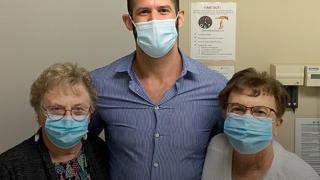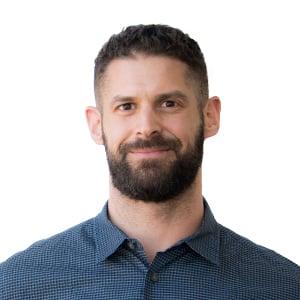Since they were children, Carol Russell and Judith Holland have been mistaken for twins. They’re not. Just sisters. But their lives have been marked by an uncanny symmetry.
They were born exactly a year and a half apart — to the day. Their mother dressed them alike when they were little girls, and without intending to, they’ll still show up in the same color outfit today. Both were full-time moms with husbands who were like brothers, and both have big, close families.
Then, five years ago, cancer intruded into their world, and the parallels grew even more unusual.
It struck Russell, the elder sister, first.
“I had been a smoker for 50-some years, and my husband wanted me screened,” she said. “That’s when I found out I had lung cancer.”
Fortunately, it was Stage 1.
Russell lives in Riverside, California, and she chose City of Hope because of its reputation. She saw thoracic surgeon Dan J. Raz , M.A.S., M.D., co-director of City of Hope's Lung Cancer and Thoracic Oncology Program. He performed a robotic lobectomy, which is far less invasive than traditional surgery, and Russell was amazed at how quickly she recovered. In a couple of weeks, her life was back to normal.
Just months after Russell’s surgery, Holland’s husband died of Stage 4 lung and throat cancer. Like her husband and sister, she had smoked for more than 50 years, and she got the message loud and clear.
“I said to myself, ‘You better go get yourself screened,’” she recalled. “They did a CT scan, saw a spot and did a biopsy.”
Like Russell’s, it was Stage 1 cancer — and in the same lobe of the lung.
Holland, who lives in Arizona, came to City of Hope so that Raz could do her surgery. The day she got out of the hospital, she felt good enough to have a friend drive her straight back to Arizona. And like her sister, after just a couple of weeks recovering, she plunged right back into her life.
But this family cancer saga doesn’t end there. This last November, Russell’s husband — the one who insisted she be screened — passed away.
“He had massive lung cancer and we didn’t know it,” she said. “He was short of breath, and they thought his heart was causing the problem. Finally he went to a nearby hospital, and two weeks later he passed.”
Why hadn’t her husband gotten screened when he so adamantly insisted she should?
“We just never thought of it because he never smoked,” she said. “But he probably got my secondhand smoke.”
The Moral of This Tale — Get Screened
As unusual as the story of these sisters is, Raz wants to underscore its universal message.
“Lung cancer is the leading cause of cancer deaths in the U.S. and worldwide,” Raz said. “It kills more men and women than breast cancer, colon cancer, prostate cancer and pancreatic cancer combined.”
Did the similarity in the sisters’ cancers have a genetic origin?
“Probably not. There are genetic lung cancers, especially in people who never smoked, but it’s very uncommon,” he said. “But what does tend to run in families is smoking.”
For Raz, the big takeaway from this story is the importance of screening. And the guidelines from the U.S. Preventive Services Task Force are in the process of changing. Previously, screening was recommended for people 55 to 80 who have 30 pack years of smoking. Though it has not yet been finalized, the current draft recommends screening for those ages 50 to 80 with 20 pack years of smoking.
A pack year is simply the number of packs a day you smoke multiplied by the number of years you’ve smoked. For example, a pack a day for 20 years or two packs a day for 10 years both equal 20 pack years.
The guidelines don’t just apply to people who currently smoke, but to anyone who has ever smoked.
“Former smokers also get lung cancer,” Raz added. “In fact, most people who develop lung cancer are not current smokers.”
What’s more, as in the case of Russell’s husband, secondhand smoke can also increase your risk of lung cancer. And even some people who have never smoked may be susceptible to the disease.
In fact, Raz explained, about 25% of women who get lung cancer have never smoked, and among Asian women with lung cancer, about 75% have never smoked.
“The good news is that when you find lung cancer at Stage 1, the cure rate is about 80%,” he said.
At City of Hope, lung cancer screening is done with a low-dose CT scan, which has about one-sixth of the radiation of a regular CT scan. It’s quick, there’s no discomfort — you don’t even have to undress.
Screening is available at the Duarte campus or at the Newport Beach community practice site, and more screening sites will be opening this year. For more information, contact lungscreening@coh.org or call 626-218-9410. City of Hope patients can also take advantage of the Smoking Cessation Program.
The Sisters Today: Living Life to the Full
“Both sisters have now been cancer-free for several years, and the chances of recurrence at this point are close to zero,” said Raz.
They both love spending time with each other and with their families — between them there are seven children, 16 grandchildren and eight great-grandchildren, with one more on the way.
Since her surgery, Holland, who’s always been the more adventurous of the two, has cruised to South America, Belize, the Caribbean, and across the Atlantic and Mediterranean to Barcelona.
We caught up with them by phone in Idaho, where they were visiting Russell’s son and Holland’s daughter for the Christmas holiday.
“We drove there and spent nights at the casinos along the way,” said Russell. “We both like to gamble. Judith used to be lucky, but now I am.”
It’s clear, though, that both are lucky, having caught their lung cancer early, to lead active lives full of love today.

